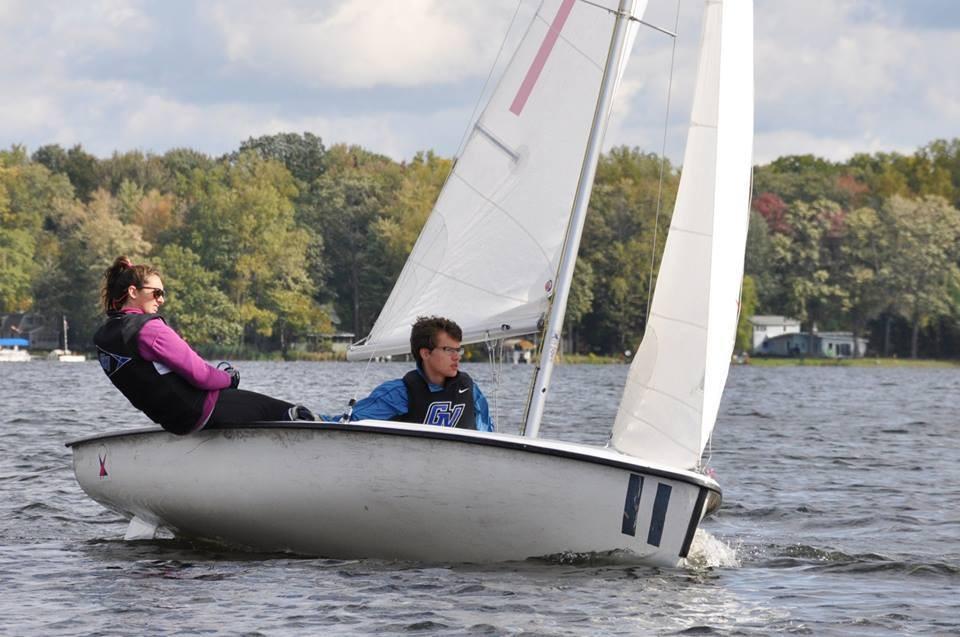GVSU club sailing to compete in top regatta

Sep 3, 2015
The Grand Valley State club sailing team has come a long way since fall of last year, when the team consisted of seven members and little-to-no experience starting a club.
This fall, the team boasts twenty active members, is eligible to receive funding from GVSU, and has been invited to the first ever Great Lakes Intercollegiate Offshore Regatta (GLIOR), as well as the prestigious Intercollegiate Offshore Regatta (IOR) held in Larchmont, New York.
“I was given quite a bit of help,” said commodore Abbey Barnes, who founded the club last fall. “From a lot of assistants who are still on the team, our faculty and the club sports director Eric Garvelink were a huge help. I had never started a club before, but Grand Valley made it pretty easy.”
Barnes promoted the club through Facebook and Campus Life Night, and got a strong nucleus of people with shared interest in the sport. She credits the executive board—vice commodore Michaela Kastura, co-vice commodore Nick Zomer, treasurer Gary Micu, and secretary Casey Blashill—with helping the club through its early stages.
The club has a partnership with the Macatawa Bay Yacht Club in Holland that allows them to use its facilities and boats for practices. Club members are required to attend at least two practices a week if they want to participate in matches – known as regattas in sailing. A member of the yacht club, Brendan Larrabee, serves as their coach and assists with fundamentals and strategy.
The club will debut two different tiers of membership this fall – competitive and non-competitive. As the names would suggest, members of the competitive crew are more active, attend more practices and compete more.
While the club wants to win, that’s not what Barnes is focusing on.
“As long as we’re all having fun and we’re all learning, and just trying to get as many people on the team as possible to share the love of the sport that we all have, that’s the most important thing to me,” Barnes said.
Sailing is not an NCAA sport. The club is one of 34 members in the Midwest Collegiate Sailing Association (MCSA), which is governed by the Intercollegiate Sailing Association (ICSA). The regular season mainly takes place in the fall, and sometimes regattas are held in the spring if the weather allows it.
“It’s not like you have a home game or an away game this week or the other,” Micu said. “It’s, these are your options for this weekend: say you can go to either Michigan State, or you can go to the University of Toledo, just as an example. And then out of those two, you decide where you’ll be the most competitive, travel times, can you get boats there, or do they have boats for you. We pick our own schedule.”
The club primarily races boats called 420s, which are 14.2-foot dinghy class boats that serve as the standard competitive sailing boat. However, the club’s members have more background in sailing larger boats.
Larger boat races are résumé based, due to the fact that boat owners are putting several hundred thousand dollar investments into the hands of college students.
“We send in resumes of six to eight of our sailors. We go through how long we’ve been sailing, what kind of boats we sail on, which position we sail, and based on that, we’re selected by the committee to compete,” Barnes said.
The GLIOR, hosted by the Columbia Yacht Club in Chicago, is the first regatta of its kind on Lake Michigan. It will be held in Chicago from Sept. 25-27. The sailors will be racing on Tartan Tens (T-10s), which are 33-foot keel boats with a maximum crew of six sailors.
The IOR, hosted by the Larchmont Yacht Club in New York, is much more prestigious, and signifies a major step in the club’s progress. It is the largest offshore regatta in the country, and the winning school goes on to the International Intercollegiate Offshore Regatta held in La Rochelle, France. The IOR will take place Oct. 9-11.
“I’m pretty proud of my team,” Barnes said. “We’re going to get a chance to show off our skills on big boats, which is what we’ve done growing up. It’s a really cool thing that a team so young is able to compete in these.”
As the club looks forward to two exciting events in its young history, the executive board feels the sea is the limit for the club and wants to leave a lasting, sustained sport at GVSU after they graduate.
“I decided to stay for a fifth year in my undergrad to make sure the team has a solid foundation before I leave. I would like to see it keep growing and have our team be known for not only having experienced competitive members, but taking the time to train and teach,” Kastura said.





















